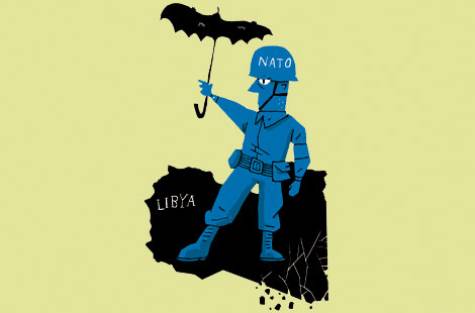
From Gordon Robison, Gulf News: [T]he haste with which Nato leaders moved to announce their exit from Libya effective Monday, bordered on the unseemly, especially since the NTC itself was publicly calling on Nato to stay on until the end of the year and expand its mission to include securing the country’s borders.
A cynic might argue that the very speed of Nato’s exit from Libya represents a kind of implicit acknowledgement that things did not go nearly as smoothly as the operation’s proponents anticipated. The western public (i.e. voters) was promised a humanitarian mission lasting, at most, a few weeks and found themselves involved instead in a bitter civil war whose endgame remained in question for months on end. . . .
The apparently genuine gratitude many Libyans feel for the assistance of Nato and its Arab allies should not obscure the fact that everything in Libya took longer, cost more money and turned out to be more politically difficult than anyone predicted on the way in.
The result is that while people were all smiles at the alliance’s Brussels headquarters last week, the long-term achievement of the Libya mission may be to ensure that Nato thinks carefully about doing anything like this again anytime soon. . . .
So success, yes, but success freighted with cautionary lessons for the future. That includes the knowing that the new Libya may collapse back into civil war. If that happens the alliance will face an agonising choice: whether to stand aside as blood flows and refugees again make their way across the Mediterranean — or to intervene again, but this time in circumstances far more messy, and far less clear-cut, than when the enemy was the little-loved Gaddafi regime.
Thus, over the weekend, it was a bit poignant to see protesters in Syria calling for a Libya-style ‘no-fly zone’ to protect them from the brutal repression of Bashar Al Assad’s regime even as exiled opposition leaders sagely debated whether to call for foreign military intervention.
It was also a bit absurd to see Al Assad himself, in a British newspaper interview, pronounce bellicose warnings against foreigners who might want to assist the protesters. . . .
He needn’t have bothered. The Syrian president surely knows — and the protesters and opposition leaders alike ought by now to realise — that no foreign help is coming.
Gordon Robison, a longtime Middle East journalist and commentator, teaches political science at the University of Vermont. (graphic: Luis Vazquez/©Gulf News)
Image: gulf%20news%2011%202%2011%20NATO%20Libya%20map.jpg
